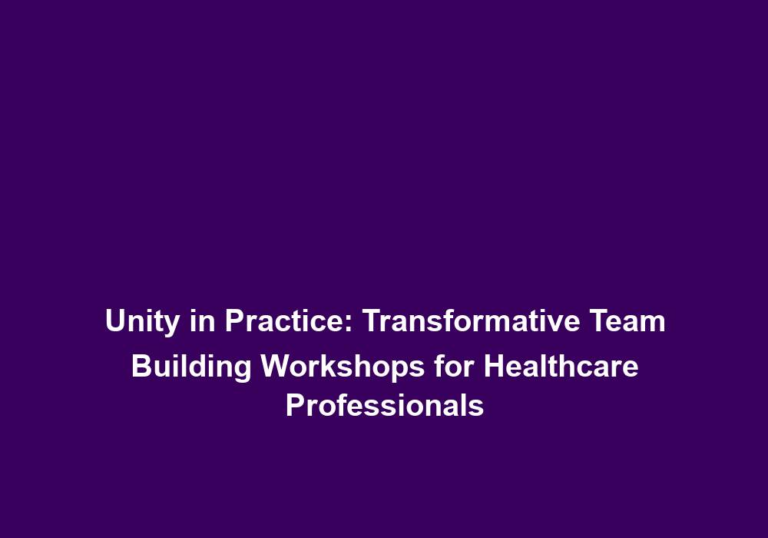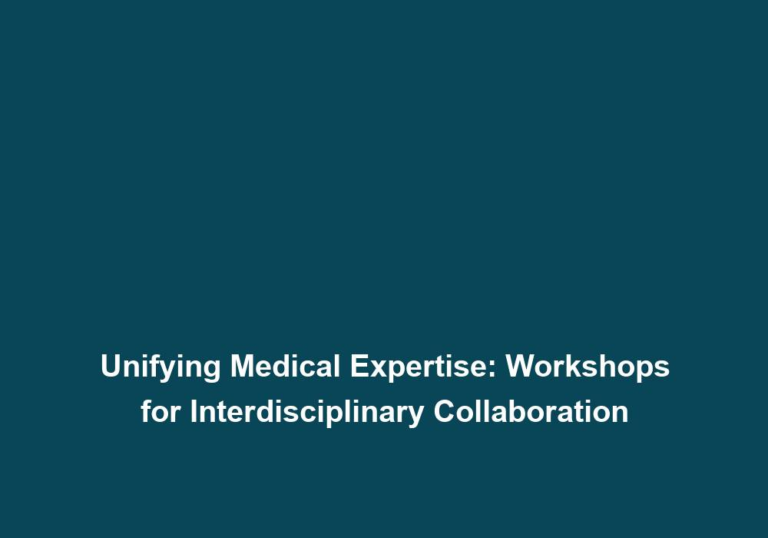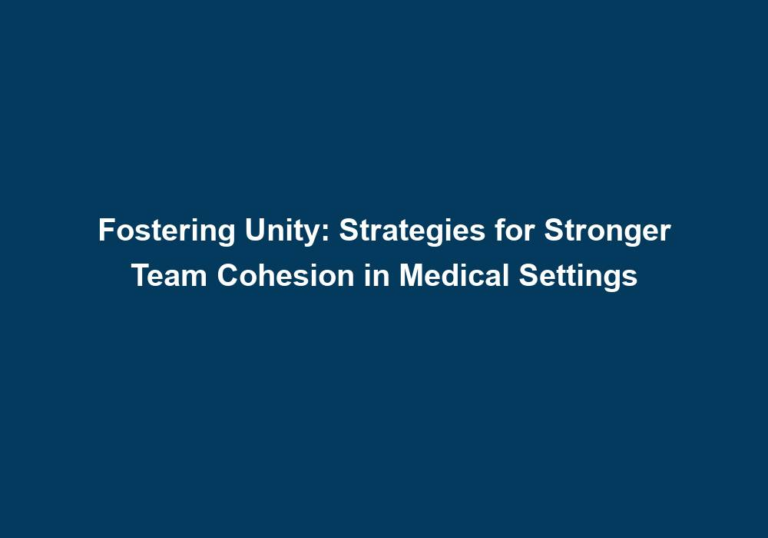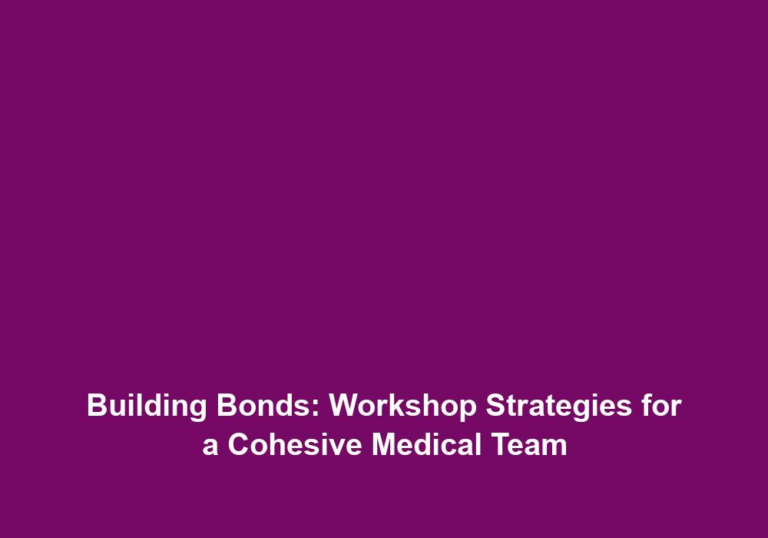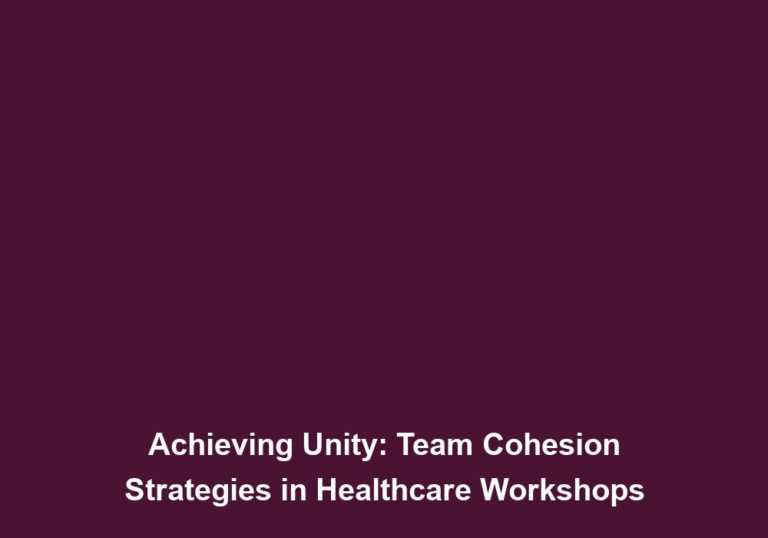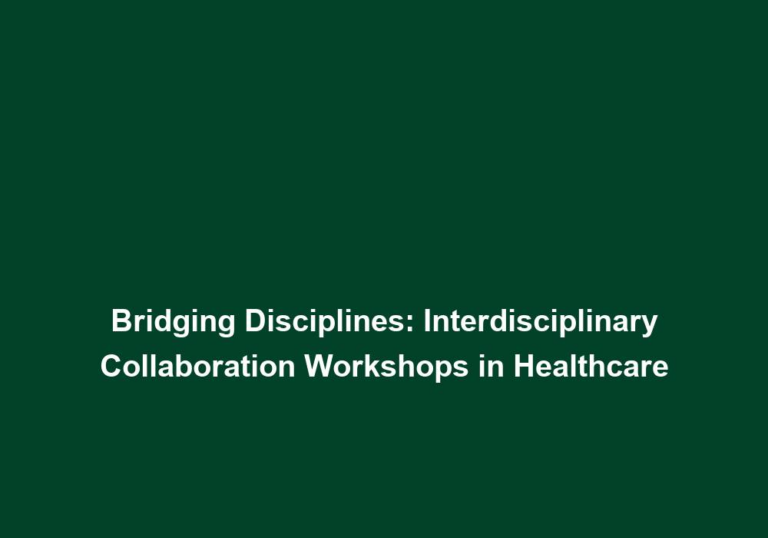Unifying Medical Teams: Effective Cohesion Strategies in Workshops
In today’s fast-paced and demanding healthcare environment, effective teamwork is essential for the smooth functioning of medical teams. Collaborative efforts not only enhance patient care but also promote job satisfaction and overall team productivity. One proven way to foster unity and cohesion within medical teams is through well-designed workshops. These workshops provide an opportunity for team members to come together, learn, and develop strategies to work cohesively towards a common goal.
Why Workshops Matter
Workshops play a vital role in strengthening medical teams by offering an interactive platform for team members to exchange ideas, share perspectives, and build trust. By engaging in various activities and discussions, participants can develop a deeper understanding of each other’s roles, responsibilities, and expertise. This not only improves communication but also paves the way for effective collaboration, which is crucial in delivering high-quality patient care.
Workshops also provide a space for team members to learn from one another and gain new insights. Through interactive sessions and knowledge-sharing activities, medical professionals can expand their understanding of different specialties and disciplines within the team. This interdisciplinary learning promotes collaboration and enhances the team’s ability to provide comprehensive patient care. Additionally, workshops create an environment where individuals feel valued and heard, fostering a sense of unity and shared purpose within the team.
Key Strategies for Effective Cohesion in Workshops
1. Establish Clear Goals and Objectives
Before conducting a workshop, it is crucial to define clear goals and objectives. These should align with the overall mission and vision of the medical team. Clearly articulated goals provide a sense of direction and purpose to participants, allowing them to focus on the specific outcomes they need to achieve collectively.
To establish clear goals, workshop organizers should consider the team’s current challenges and areas for improvement. By identifying these areas, the workshop can be tailored to address specific needs and facilitate the development of practical strategies. Each goal should be specific, measurable, attainable, relevant, and time-bound (SMART). This ensures that the objectives are realistic and can be effectively measured for progress and success.
2. Encourage Active Participation
To promote engagement and active participation, workshop organizers should design activities that encourage all team members to contribute. This can include group discussions, brainstorming sessions, or problem-solving exercises. By involving everyone, workshops become more inclusive, allowing individuals to feel valued and heard.
One effective way to encourage active participation is through the use of breakout sessions or small group activities. These sessions provide an opportunity for team members to collaborate closely, share ideas, and work together towards finding solutions. By actively involving each participant, workshops create a sense of ownership and accountability, leading to stronger team cohesion.
3. Foster Open Communication Channels
Effective communication is the foundation of any successful team. In workshops, it is important to create an environment where participants feel comfortable expressing their opinions, concerns, and ideas openly. This can be achieved by encouraging active listening, providing constructive feedback, and promoting a culture of respect and understanding.
To foster open communication, workshop organizers can implement techniques such as active listening exercises, role-playing scenarios, and group feedback sessions. These activities help team members develop effective communication skills and enhance their ability to express themselves clearly. Additionally, creating a safe space where individuals feel comfortable sharing their thoughts and ideas fosters trust and strengthens team relationships.
4. Promote Collaboration and Interdisciplinary Learning
Medical teams are often composed of individuals with different areas of expertise. Workshops provide an excellent opportunity for team members to learn from each other and gain a broader understanding of the various disciplines within their team. By promoting interdisciplinary learning, workshops foster collaboration and enhance the team’s ability to provide comprehensive patient care.
To promote collaboration, workshop organizers can incorporate collaborative activities that require team members to work together towards a common goal. This could include case studies, simulations, or problem-solving exercises that involve input from multiple disciplines. By engaging in such activities, team members not only learn from one another but also develop a deeper appreciation for the value each specialty brings to the team.
5. Utilize Team-Building Exercises
Team-building exercises are a valuable tool for enhancing trust, fostering camaraderie, and strengthening relationships within medical teams. These exercises can range from icebreaker activities to more complex problem-solving challenges. By engaging in such exercises, team members can develop a sense of unity and shared purpose.
Team-building exercises can take various forms, such as trust-building activities, collaborative games, or outdoor challenges. The goal is to create an environment that encourages teamwork, communication, and problem-solving skills. These exercises promote bonding and improve interpersonal relationships, ultimately leading to a more cohesive and supportive medical team.
6. Provide Continuous Learning Opportunities
Professional development is crucial for the growth and success of medical teams. Workshops should not be seen as a one-time event but rather as a continuous learning process. Organizers should provide resources, follow-up sessions, and opportunities for ongoing education to ensure that the knowledge gained from the workshop is applied in the workplace effectively.
To provide continuous learning opportunities, workshop organizers can offer post-workshop resources such as online courses, webinars, or professional conferences. These resources allow team members to further enhance their knowledge and skills, reinforcing the concepts and strategies discussed during the workshop. Additionally, follow-up sessions or refresher courses can be organized to review progress, address challenges, and provide additional support as needed.
7. Evaluate and Incorporate Feedback
To ensure the effectiveness of workshops, it is essential to gather feedback from participants. This feedback can be obtained through surveys, focus groups, or individual discussions. By evaluating this feedback, organizers can identify areas for improvement and make necessary adjustments to future workshops, ultimately enhancing their impact on team cohesion.
Feedback should be collected at various stages of the workshop, including before, during, and after the event. This allows organizers to gauge participants’ expectations, assess the effectiveness of workshop activities, and measure the overall satisfaction of the attendees. Incorporating feedback into future workshops demonstrates a commitment to continuous improvement and ensures that the needs and preferences of the team are addressed.
Conclusion
In conclusion, workshops serve as a powerful tool for unifying medical teams and promoting effective cohesion. By establishing clear goals, encouraging active participation, fostering open communication, promoting collaboration and interdisciplinary learning, utilizing team-building exercises, providing continuous learning opportunities, and incorporating feedback, medical teams can develop a strong sense of unity and purpose. These strategies not only improve team dynamics but also enhance patient care outcomes, job satisfaction, and overall productivity. Embracing workshops as a means of strengthening teamwork can truly transform the way medical teams operate in today’s ever-evolving healthcare landscape.


